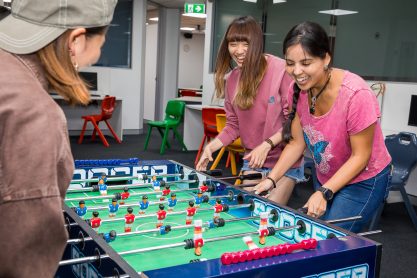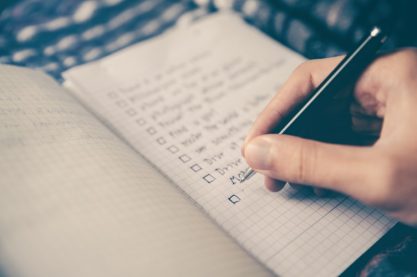My name is Hayden and I am the Director of Studies at Langports, Gold Coast. I have held this position for more than 6 years and I would like to share some useful tips on how you can improve your English.
My top 10 tips that will help you to improve your English are:
 1. Make as many friends with students who do not speak your native language as you can.
1. Make as many friends with students who do not speak your native language as you can.
Some students struggle being away from home. Making friends with others who come from your country can help with homesickness while you are here.
However, from a language learning perspective, it is best not to use your native language.
Try to immerse yourself in the English language by making friends with those who do not share your mother tongue
 2. Join a community group or take up a hobby. By doing either of these things, you are bound to connect with local Australians and this is exactly what you want.
2. Join a community group or take up a hobby. By doing either of these things, you are bound to connect with local Australians and this is exactly what you want.
Community groups like yoga classes, running groups or art classes are just the places where you will find like-minded people such as yourself and where you will be able to practice your English.
 3. Join a library. Joining not only the library at your campus in either Brisbane, Gold Coast or Sydney, but your closest public library is a great way to improve your English.
3. Join a library. Joining not only the library at your campus in either Brisbane, Gold Coast or Sydney, but your closest public library is a great way to improve your English.
Reading books and taking part in library-based activities will certainly expose you to the English language in its many forms and will have a positive effect on your English language development.
 4. Set realistic and achievable goals. By doing this, you will eliminate some of the stresses that students sometimes feel while they are studying with us.
4. Set realistic and achievable goals. By doing this, you will eliminate some of the stresses that students sometimes feel while they are studying with us.
For example, if you are at a Pre-Intermediate level, make some small achievable goals to perhaps improve your macro-skills to an Intermediate level as opposed to wanting to be an Advanced user of the the language straight away. By achieving small goals along the way, your confidence will increase and so too will your English.
 5. Watch the news on TV and read the newspaper. Listening to and reading the news both on TV and in the newspaper are excellent ways to expose yourself to formal language structures and for the most part, structures that are grammatically correct.
5. Watch the news on TV and read the newspaper. Listening to and reading the news both on TV and in the newspaper are excellent ways to expose yourself to formal language structures and for the most part, structures that are grammatically correct.
And some more…
6. Try and limit the amount of times you use an electronic dictionary in class. There will be times when using a dictionary is both appropriate and necessary to your language development in class.
However, try not to over rely on using it as it can be of a hindrance at times. For example, trying to make a direct translation from your native language into English can be misleading while at other times and in the case of phrasal verbs, a direct translation may not exist.
 7. Be brave and take risks. Learning a new language could be viewed as a daunting task or it could be viewed as an opportunity for you to be amazing and to express yourself. Be the latter and take risks with your English language development as only then will you realise your true capabilities and what you can do.
7. Be brave and take risks. Learning a new language could be viewed as a daunting task or it could be viewed as an opportunity for you to be amazing and to express yourself. Be the latter and take risks with your English language development as only then will you realise your true capabilities and what you can do.
8. Speak with the Director of Studies or your teacher about the many study options you have at Langports. At Langports, we offer an array of courses (TOEIC, IELTS, EAP, Cambridge FCE/CAE/CPE) that can help you to improve your English at an accelerated rate. So, speak with one of our amazing academic managers or professional teaching staff, and ask for a tailored study plan that fits your needs.
 9. Use social networking sites in English. With social media consuming such a big part in all of our lives, you should try to interact with social media in English. This will no doubt help to improve your overall English language skills, even if it proves challenging to begin with.
9. Use social networking sites in English. With social media consuming such a big part in all of our lives, you should try to interact with social media in English. This will no doubt help to improve your overall English language skills, even if it proves challenging to begin with.
 10. Live with either native English speakers or people who do not speak your native language. Because we all spend so much time at home, being able to use English while you are at home would most certainly improve your English language development.
10. Live with either native English speakers or people who do not speak your native language. Because we all spend so much time at home, being able to use English while you are at home would most certainly improve your English language development.
So let’s recap
Here are my 10 tips to help you improve your English language development while you are here in Australia:
 Make friends, join community groups, join a library, set realistic goals, watch the news and read the newspaper, limit your use of your electronic dictionary, take risks, organise a study plan, use social networking sites in English, live with people who do not speak your native language!
Make friends, join community groups, join a library, set realistic goals, watch the news and read the newspaper, limit your use of your electronic dictionary, take risks, organise a study plan, use social networking sites in English, live with people who do not speak your native language!
I wish you all the best and happy studying!
Related blog posts:
Tips for Improving Listening
Tips For Improving Your Speaking
EXTRA-ordinary English ONLY
How do I improve my writing?